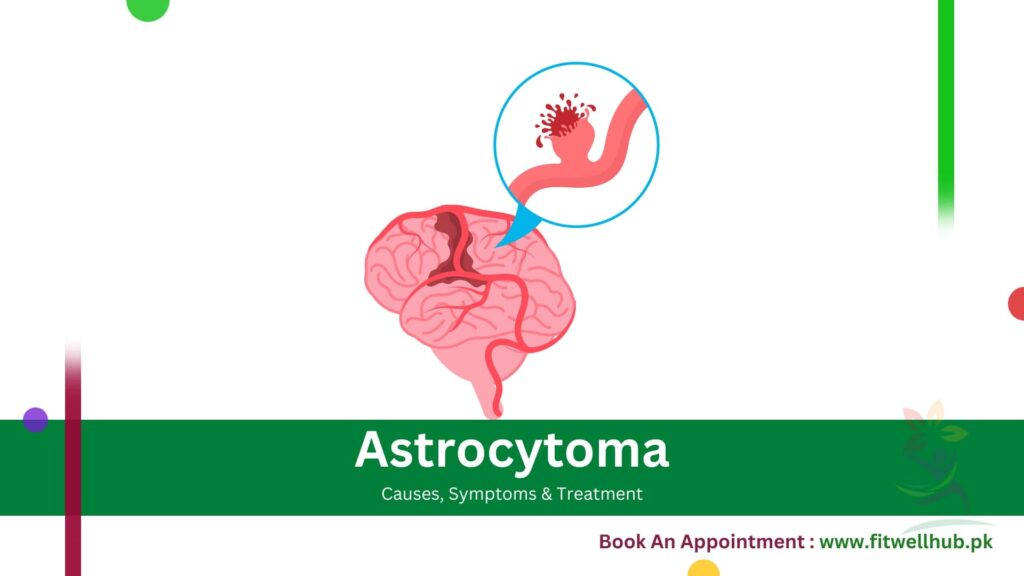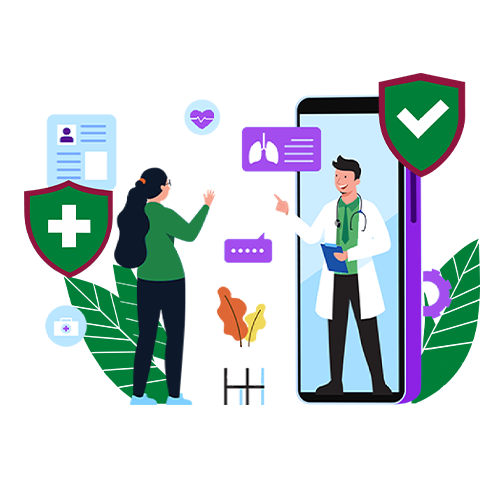Astrocytoma is a type of brain tumor that begins to develop from star-shaped cells in the supportive tissue of the brain. However, they can occur anywhere within the brain or the spinal cord and vary in severity from slow-growing types, referred to as low-grade, to more aggressive, high-grade tumors. Astrocytomas can occur at any age, but they are relatively more common among adults.
Quick Links
ToggleSymptoms depend upon the size and location of the tumor. The most important step in the management of this condition is early detection and treatment, which leads to better outcomes. At Fitwell Hub, we use telehealth and AI technologies to provide remote patient monitoring and advanced imaging for astrocytomas. This helps provide faster, personalized care to patients across Pakistan, improving accessibility and treatment outcomes.
Symptoms
Common symptoms of astrocytoma include:
- Headaches: A headache, generally persistent, is one of the common symptoms of astrocytomas. These headaches worsen in the morning or following hard physical activity, with the severity worsening as the tumor grows.
- Seizures: Absence seizures can occur due to astrocytoma in adults with no prior seizures or any history of epilepsy. These seizures typically present as brief, sudden lapses in awareness and may vary in intensity, being focal or generalized.
- Nausea and Vomiting: Nausea and vomiting, particularly in the morning or after lying down, can occur in patients due to a growing tumor and increased intracranial pressure. For more information, visit the symptoms of adnexal tumor.
- Cognitive Changes: Tumors affecting certain brain areas can cause cognitive issues, such as memory loss, confusion, difficulty concentrating, or personality changes.
- Weakness or Paralysis: Astrocytomas present in or near the motor cortex can cause muscle weakness or even paralysis on one side of the body. It affects coordination and mobility.
GET IN TOUCH
Book An Appointment
When to See a Doctor
If you are suffering from persistent headaches, sudden seizures, or any other neurological symptoms like changes in behavior, vision problems, or motor weakness, you should consult with a healthcare provider. Early diagnosis can help in treating astrocytomas and preventing complications.
A neurologist will recommend imaging tests like an MRI or CT scan to evaluate the presence of a brain tumor. At FitwellHub, we offer comprehensive neurology evaluations and diagnostic services to help detect conditions like astrocytomas.
Causes
The actual causes of astrocytomas are not fully known, but the following are some contributing factors:
1- Genetic Mutations
It is considered that astrocytomas originate due to genetic mutations in the DNA of astrocytes, which cause these cells to divide and grow in an uncontrolled manner to form a tumor.
2- Radiation Exposure
Individuals who have received any type of radiation, especially around their head or neck, have a higher risk of developing astrocytomas in later life.
3- Family History
Inherited genetic disorders, as part of a person’s medical history, such as neurofibromatosis, can also predispose an individual to astrocytomas and other tumors of the brain.
4- Weakened Immune System
A weakened immunity, either due to infection with the human immunodeficiency virus or due to certain forms of immunosuppressive therapies, also leads to this type of cancer.
5- Environmental Factors
Environmental toxins or chemicals, though not exactly proven, may also increase the possibility of the development of astrocytoma.
Risk Factors
Primary risk factors for developing astrocytomas include:
- Age: Astrocytomas can occur at any age but most often appear in adults, mainly between ages 30 and 50.
- Genetic Disorders: Certain genetic disorders are hereditary, like Li-Fraumeni syndrome or tuberous sclerosis, and may increase the risk of brain tumor development, including astrocytomas.
- Radiation Therapy: A medical history of radiation therapy, especially for other cancers, often leads to the onset of brain tumors.
- Immune System Suppression: HIV/AIDS or any immunosuppressive treatment for it results in suppressing the immune system of the body and exposes it to astrocytomas.
- Gender: Astrocytomas are more common in men than in women, although the exact causes are still unknown.
Complications
Astrocytomas may lead to several types of hazardous complications if they are left untreated, including:
- Increased Intracranial Pressure: The tumor may cause headaches, vomiting, and blurred vision as it grows because it increases pressure inside the skull. Increased pressure on the brain causes brain damage if left untreated.
- Brain Swelling (Edema): Astrocytomas can cause swelling, of the brain, which may further restrict the flow of blood and result in serious neurological problems, including coma.
- Seizures: As the tumor irritates brain tissue, seizures become more frequent and difficult to control, leading to an increased risk of injury or loss of consciousness.
- Cognitive Decline: The tumors in the brain lead to progressive cognitive decline, such as loss of memory, inability to concentrate on any work, or even personality changes.
- Coma: If left untreated, astrocytomas may increase pressure on the brain and thus eventually lead to unconsciousness or coma.
Prevention
Though it is not possible to prevent astrocytomas completely, the following steps can help reduce the risk:
- Limit Radiation Exposure: Minimize exposure to unnecessary radiation, particularly to the head and neck. It decreases the risk of developing brain tumors.
- Maintain a Healthy Immune System: Maintain a strong immune system through regular exercise, proper nutrition, and managing chronic conditions like HIV. It lowers the risk of astrocytomas.
- Regular Health Screenings: You should go for regular check-ups to monitor for any signs of abnormal growth if you have a family history of brain tumors or genetic disorders.
- Avoid Environmental Toxins: There are a lot of toxins in the air we breathe, the water we drink, and the food we eat that trigger tumor growth. Avoid these substances as much as possible to prevent risk.
- Genetic Counselling: Genetic counseling can be effective in helping people with inherited genetic defects associated with brain tumors identify their risk and take preventive action.
To assist people in managing their risk factors, at FitwellHub we provide genetic counseling services and preventative health programs. Visit our help page for more information.
Diagnosis
Several imaging and diagnostic procedures are used to diagnose astrocytomas to determine brain function and identify abnormal growth.
1- Magnetic Resonance Imaging (MRI)
The most common test that is performed to detect astrocytomas is MRI. This imaging technique gives detailed pictures of the brain, provides a location of the tumor, and gives the exact size of the lesion.
2- Computed Tomography (CT) Scan
A CT scan provides quick images to detect brain tumors, particularly in emergencies where rapid diagnosis is required.
3- Positron Emission Tomography (PET) Scan
A PET scan is used to analyze the metabolic activity of the tumor and the rate at which it is growing.
4- Neurological Exam
This test is used to analyze the patient’s cognitive ability, reflexes, and coordination to determine the severity of the tumor affecting brain function.
5- Biopsy
In this procedure, a tissue sample is taken from the tumor to evaluate the type and grade of the astrocytoma.
At FitwellHub, our advanced diagnostic services include brain imaging and testing to accurately diagnose and assess astrocytomas. Visit our lab for more information.
Treatment
The treatment of astrocytomas depends on the location and severity of the tumor and involves a combination of the following procedures:
:
| Treatment Type | Description | Use Case |
|---|---|---|
| Surgery | The surgical removal of the tumor. | Common for low-grade tumors; not possible for tumors in sensitive brain areas. |
| Radiation Therapy | Uses high-energy radiation to target tumor cells. | Removes remaining tumor cells after surgery or treats incurable tumors. Reduces symptoms and shrinks tumors. |
| Chemotherapy | Uses drugs to kill cancerous cells. | Often combined with radiation therapy, especially for high-grade astrocytomas. |
| Targeted Therapy | Includes therapies like bevacizumab to target specific growth molecules. | Provides a personalized approach to treatment. |
| Steroids | Reduces inflammation and brain swelling caused by the tumor. | Relieves symptoms such as headaches and nausea. |
Medications
Some of the drugs used in the treatment of astrocytomas include:
- Anticonvulsants: Use anticonvulsants to limit the seizures caused by astrocytomas and to prevent any other secondary complications from recurring seizures.
- Chemotherapy Drugs: Chemotherapy drugs like temozolomide are used to kill cancerous cells and stop their growth or spread.
- Steroids: Use steroids like dexamethasone to reduce swelling in the brain and relieve symptoms such as headaches and nausea.
- Targeted Therapies: In targeted therapies, a specific pathway is targeted that contributes to the proliferation of cancer. Doctors also combine it with other therapies to help control high-grade astrocytomas.
At FitwellHub, we provide a wide range of medications to manage and treat astrocytoma. Visit our pharmacy to explore available options and consult with our experts.
GET IN TOUCH
Book An Appointment
Frequently Asked Questions (FAQ’s)
Astrocytoma is a type of brain tumor that begins to develop from star-shaped cells in the supportive tissue of the brain.
Yes, low-grade astrocytomas are curable with surgery. While high-grade astrocytomas are more difficult to treat and often require continuous management.
For the diagnosis of astrocytomas, imaging tests like MRI or CT scans are used along with a biopsy to detect the tumor’s type and grade.
Surgery, radiation therapy, chemotherapy, and targeted therapies are used for the treatment of astrocytoma depending on the tumor’s grade and location.
Long-term complications include cognitive decline, seizures, and increased intracranial pressure, particularly in high-grade astrocytomas.














